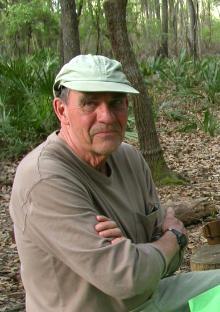Professor honored for distinguished career in tropical biology
July 22, 2015

Throughout his career, Jack Ewel has explored exotic locations, climbed ancient mountains and gained wisdom from the people and cultures around the world.
Ewel, an emeritus professor in the University of Florida Department of Biology, has worked in ecology and tropical forestry since the early 1960s. Recently, he was elected as an Honorary Fellow in the Association for Tropical Biology and Conservation. This is the highest honor awarded by the ATBC, with two fellows selected each year for their distinguished history in the field.
Ewel will be honored this month at the association’s meeting in Honolulu, which he said will be a homecoming for him since he worked and lived in Hawaii for 11 years. He has also worked in the Caribbean, Latin America, Africa, Asia and the Pacific Islands.
After graduating from Syracuse with a bachelor’s degree in forestry, Ewel moved to Puerto Rico, where he took a tropical forestry class. While most of his classmates returned to the States to complete a master’s program after finishing the course, Ewel stayed in Puerto Rico to work in the field and study Spanish at night school.
After about a year in Puerto Rico, he worked on ecological mapping in Venezuela for three years. During this time, he participated in an expedition for the Venezuelan and Brazilian governments to find the boundary between the two countries, which allowed him to climb tepuis, ancient table-top rock structures, and live among the Yanomami, an indigenous tribe.
“It was a very enriching biological experience, one that few people had ever experienced,” Ewel said.
Of all the places he has traveled, Ewel is most captivated by the culture of Micronesia.
“It’s such a gentle culture in its way,” he said. “The people really live in pretty close harmony with their natural resources.”
Ewel received his master’s degree from UF and his doctorate degree from the University of North Carolina at Chapel Hill, where he worked with noted ecologist Howard Odom. Ewel was hired at UF in 1971 and was named teacher-scholar of the year in 1991.
In 1994, he became the director of the U.S. Forest Service’s Institute of Pacific Islands Forestry and moved to Hawaii. Although Ewel retired in 2005 “not very successfully,” he returned to Gainesville and is now synthesizing 13 years’ worth of research from his time in Costa Rica. He and his wife, Katherine – also an emeritus professor of ecology – grow pecans and pines on a farm in northern Alachua County. They are restoring a portion of the property to the natural ecosystem that existed there in the 1930s.
